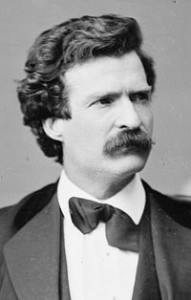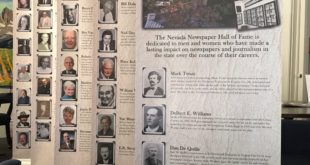
After trying his luck at prospecting, Mark Twain began his literary career in earnest while writing stories for the Territorial Enterprise in Virginia City. He developed and polished his writing style while on the staff of the famous newspaper. Twain believed that people, not facts, make news, and he always played up the human-interest side of a story. He came to the Territory of Nevada in 1861 and left three years later.
Here are a few paragraphs on his Nevada days from Twain’s obituary in the New York Times:
“His experience as a Confederate soldier was brief and inglorious. Hardly had he enlisted before he was captured. Released on parole, he broke the parole and returned to the ranks, and soon was recaptured. He was in imminent peril, for recognition meant immediate and ignominious execution, but he got away, and determined never to take the risk again. He stopped flight only on reaching Nevada, where several letters of his to The Virginia City Enterprise resulted in an offer from the editor of that paper of a place on the staff. From that day forward Clemens earned his living with his pen, but with the exception of several excursions [text unreadable].
“From Nevada, Mark Twain moved out to San Francisco where, after a brief service on the local staff of The Call, he was discharged as useless. Then he and Bret Harte were associated in the conduct of The Californian, but both soon deserted the paper to make their fortunes mining if they could. Neither did, and Mark Twain was soon back in San Francisco penniless and ill. This was in [text unreadable.] The Sacramento Union sent him to the Sandwich Islands to write a [text unreadable] of letters on the sugar trade- an arrangement which this time he filled to the editor’s satisfaction- and returned restored to health.
“That Winter, however, was one of “roughing it” for him. He could get little to do as reporter or editor, and finally took to lecturing in a small way. He was a success from the start. He spoke in many of the small towns of California and Nevada, earning more than a living, and meantime writing sketches for Eastern papers. These attracted considerable notice, and in March of 1867 he issued his first book, containing the “Jumping Frog” and other stories. Its reception was so cordial that Mark Twain decided to try his fortunes in the East. On reaching New York he learned that a secret excursion was about to start for the Holy Land in the steamer Quaker City. He persuaded the Alta California, for which he had been writing, to advance him the price of the ticket for this trip – [text unreadable]- to be paid in letters at $15 each. He made his trip, which proved the beginning of his fortune, for “Innocents Abroad,” his first famous book, had taken shape in his mind before his return.
“To write the book, however, and to live at the same time was a problem, but Senator W. M. Stewart of Nevada, becoming interested in the project, obtained for him a six-dollar-a-day committee clerkship, while the work was “farmed” out to another man at $100 a month.
 Nevada Press Association The best in Nevada journalism since 1924
Nevada Press Association The best in Nevada journalism since 1924




